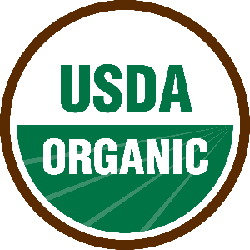One of the hottest buzz words in food right now is “organic.” I want to help you better understand what these foods are, what you stand to gain from them and a few of the negatives.
What is organic?
In order for a food to be labeled organic it needs to be grown and processed without using any genetic engineering procedures, or without any synthetic/artificial fertilizers (must use real fertilizers). Organic foods are grown without the use of all “-cides”, meaning no pesticides, herbicides, or fungicides. Also, the food must be grown or processed without antibiotics, preservatives, chemicals, or use of radiation. In short, the food was produced and processed in the most natural way and delivered to consumers in the purest form without any chemical tainting. To be certified organic a product must bare the USDA certification of 100% organic. This seal means the farm has been evaluated and tested by a set standard of practice and is certified after passing.
PROs
- Food is in its most natural, pure form
- No harmful pesticides, herbicides, or fungicides are used
- With the USDA 100% organic seal you know you are consuming a safe, healthy product
- Fruits and vegetables grown organically are supposedly more nutrient dense, have a higher antioxidant content (research suggests it, but more research is needed)
- In terms of buying organic meat, eggs and dairy you will be receiving a hormone-free, free-range product. Reducing the amount of foreign substances you put into your body can have positive health benefits. Think about it, do you really want to be consuming a bunch of chemicals?
- Organic farming practices are considered a more “green”, eco-friendly way of farming. Having healthier soils and the surrounding animal life is supposedly better on the actual farmer!
CONs
- Cost. Organic foods tend to be more expensive. On average, it’s been estimated that consumers spend 50% more on organic products and 100% more on meat and dairy organic options.
- Food Safety. Some organic foods do contain pesticides (they may be able to contain trace amounts and still be approved as 100% organic).
Also read An Argument for Organic: The Cleanest and Dirtiest Produce Items.

Thank you for your endorsement of organic, and for sharing many of the benefits associated with it. The Organic Trade Association would like to follow up on what you identify as “cons” of organic. You state that “organic foods tend to be more expensive.” In fact, when you buy organic products, you are paying the true cost of the food. By contrast, when you buy non-organic products, there are hidden costs for which everyone will pay indirectly—these are called ag “externalities,” and they include damage to water sources, damage to soil resources, damage to wildlife and ecosystem biodiversity, and damage to human health from such things as exposure to pesticides.
It’s also worthwhile to note that buying organic is easier and more affordable than ever before. Not only do organic products appear on store shelves in mainstream retail outlets, but thanks to organic private label products, growing numbers of farmers’ markets, and organic’s lack of dependence on petroleum-based farm inputs, the gap between organic and non-organic prices is closing. Indeed, in some cases, the price of organic goods is comparable to non-organic goods.
The other criticism that you make of organic food revolves around food safety. It is important to realize that certified organic growers not only are inspected by third-party independent certifiers in order to qualify for organic certification, but they also follow strict guidelines for safe and hygienic food production. As with all food producers, they must also be in compliance with local, state and federal health standards.
For these and many other reasons, the message is clear: Organic. It’s worth it.
I have found that more often then not the price is higher for organic foods versus non-organic foods, whereas I can justify buying some items organic I cannot financially afford to go 100% organic and I know plenty of other people that feel the same way. The price gap might be closing, but there’s still a gap to consider. For example I purchased 1/2 gallon of organic milk for close to $4.00(mind you it was on sale too) whereas I could have got a gallon of non-organic milk for $3.50. For me I would rather pay extra and have less of a better quality product, but most of our society does not feel that way.
As far as the food safety goes, I’m aware that the farmer’s have strict guidelines to follow, but I thought that even though they have these guidelines to follow they only got reviewed once every three years or so? Please share with me if my information on that is incorrect.